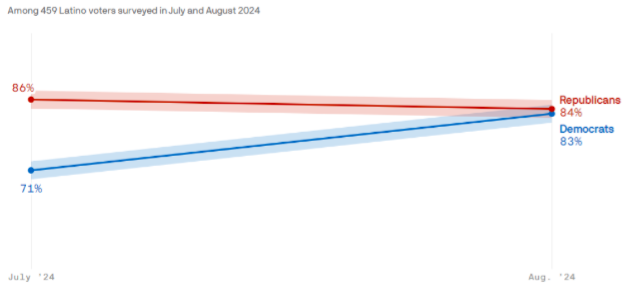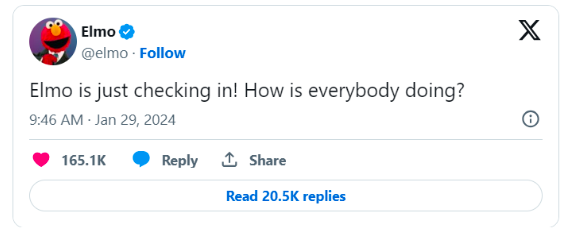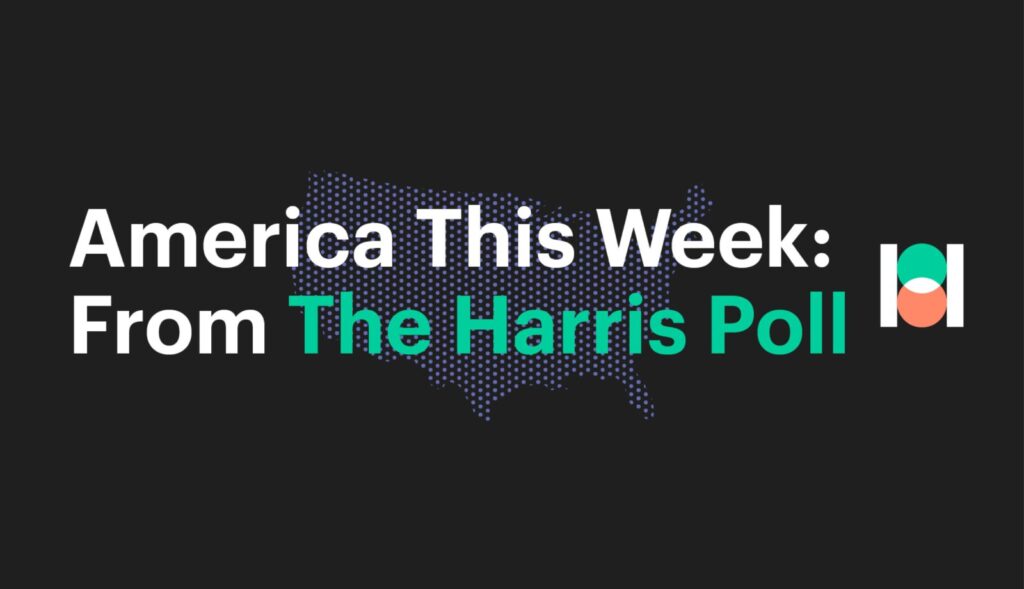Brief • 4 min Read
Dems Heat Up, Elmo Checks In, Bummer Billionaires, and Renting Over Owning
The latest trends in society and culture from The Harris Poll
Good afternoon from Chicago, where we are with Axios at the DNC, sharing new research on Latino Americans for our Axios Vibes-Harris Poll. Check out our CEO John Gerzema’s panel on our findings with Axios’ Sara Goo and former DNC chair Tom Perez.
While the DNC takes over the Windy City, so do the sharp elbows. In our America This Week tracker fielded August 15th to 17th, among 2,121 Americans, (77%) are concerned about political divisiveness in the U.S. – an issue Democrats and Republicans are equally worried about (79% v. IND: 74%).
Quick plug: How culturally relevant is your brand? Movers+Shakers‘ and The Harris Poll have developed an index on how brands achieve cultural relevance amongst Gen Z. Please help us by voting for our SXSW PanelPicker here.
Ok, this week, we have four new Harris polls that caught our interest:
- Latino Democratic voters are finally excited about the election: Axios Vibes/ Harris Poll.
- After Elmo’s viral moment, we release our new well-being report with Sesame Workshop.
- Americans’ love affair with billionaires is waning today.
- From clothes to cars, a growing number of Americans love the flexibility of renting.
Dems Are Now Pumped: Axios Vibes By The Harris Poll
Democrats have closed a significant enthusiasm gap among Latino voters in the weeks since President Biden dropped his re-election bid, according to the latest Axios Vibes By The Harris Poll survey in partnership with Noticias Telemundo.
- The big picture: (83%) of registered Latino Democratic voters and (84%) of Latino Republican voters now say they’re extremely likely to vote. In last month’s survey, only (71%) of Latino Democrats felt that way, compared with (86%) of Latino Republicans.

- (63%) of Latino voters in both major parties now say they’re enthusiastic about voting, closing last month’s 16%-point gap of (40%) for Democrats and (56%) for Republicans.
- (73%) of Latino voters (and 67% of non-Latino voters) said they’re more hopeful for the country’s future. In comparison (60%) of Latino voters (and 53% of non-Latino voters) said they feel reinvigorated by politics.
- (48%) of Latino voters also described their economic situation as good (4%-pts higher than in July), while housing affordability and wages are outsized issues for Latino voters compared with non-Latino voters.
Takeaway: (75%) of all Latino voters agreed that, with Biden’s age out of the way, finally, we can talk about the issues that really matter. Those issues are, first and foremost, economics. As [Harris] seeks to define herself, Latino voters are giving her a blank slate to say, “Come and tell us how you’re going to go after these issues,” says Gerzema. But how long that slate is blank is anyone’s guess.
Elmo Checks In: Sesame Workshop-Harris Poll
When Elmo posted a casual wellness check online earlier this year, the “Sesame Street” character unwittingly opened the floodgates to a deluge of online angst. Six months later, Elmo’s creators at Sesame Workshop have collaborated with the Harris Poll to conduct a more thorough check-in on the state of Americans’ mental health, as covered by NBC News, LA Times, etc. Here’s what we found:

- Over a quarter (27%) said their mental or emotional health, or that of someone in their family, was negatively impacting their well-being. That was essentially tied with the (28%) who were negatively affected by a problem with physical health.
- Mental and emotional health was a particular burden on teens: (54%) of the 16- and 17-year-olds who took the survey said psychological issues had a negative impact on their overall well-being. So did (32%) of parents and (41%) of people who identified as LGBTQ+.
- (67%) of Americans wish their parents had been more transparent about their struggles with mental health – particularly true for younger Americans (teens: 77%, Gen Z: 77%, Millennials: 78%).
- Looking ahead: (77%) of respondents say to improve the well-being of future generations, the U.S. should prioritize investments in emotional and mental health.
Takeaway: “We could not have predicted the overwhelming response that followed Elmo’s post,” Samantha Maltin, chief marketing and brand officer of Sesame Workshop, said in a news release, adding that the Muppet’s post drew millions of responses. “As Elmo’s viral moment and this new study indicate, the most pressing issue facing American families right now is mental health and emotional well-being.”
Billionaires Fall From Their Pedestals: Fortune-Harris Poll
Whether it be Bill Gates or Elon Musk, Americans are starting to fall out of love with their billionaires. Amidst surging inequality, many Americans simply aren’t buying the innate worth of the mega-rich, according to our latest research, which Fortune covered.
- There is a growing sense of wariness: More than half of Americans (59%) believe that billionaires are creating a more unfair society.
- And said society is unfolding in front of our eyes, as a whopping (71%) deem wealth inequality a severe national issue (+5%-pt increase from 2022), especially BIPOC and Hispanic respondents.
- Also, (58%) blamed billionaires for accelerating inflation, while (62%) agreed that “America has become a backyard” for said rich people.
- In America alone, billionaires are $1.6 trillion wealthier than during the early pandemic (nonprofit Oxfam points out in its report, Inequality Inc.).
- While many Americans (46%) don’t believe in limiting wealth, even more (69%) suggest taxing the rich. Younger adults are at the forefront of this movement, with 80% of Gen Zers in favor of taxing the wealthy.
Takeaway: “These findings reveal a society that admires wealth but also demands greater accountability and equity,” said Libby Rodney, chief strategy officer at The Harris Poll. “It’s a call for a more balanced and fair economy where success benefits everyone, not just a select few,” she continued, explaining that while America is “obsessed with tales of overnight millionaires and ventures that promise substantial returns,” that shine has dulled as economic disparities widen.
Opting For Rent-First Lifestyles: Credit Karma-Harris Poll
According to our latest research with Credit Karma, the new trend of under-consumption now includes renting everything from clothes and furniture to cars and sporting equipment. Renting is now a lifestyle choice,
- More than a quarter of Americans (28%) rent or lease goods/services, whether that be their car (17%), clothing or accessories (9%), electronics (8%), furniture (7%), etc. When factoring in housing, the percentage of American renters/leasers jumps to (47%).
- Owning isn’t all it’s cracked up to be: (58%) of those who rent or lease goods/services say they live a rent-first lifestyle, choosing to rent as a personal choice.
- What’s driving the decision to rent/lease? The top reason is the flexibility that renting allows (35%), followed by being better able to save money (31%), wanting to try things out first before deciding whether to make a purchase (27%), and avoiding overconsumption (21%).
- Nearly 3 in 5 Americans who rent/lease goods or services (58%) say they find more value in renting than buying, and (64%) don’t subscribe to the notion that renting translates to throwing away money.
Takeaway: “Over the last decade, we’ve seen the ‘rental economy’ gain popularity as more opportunities to rent goods and services have flooded the market, offering consumers short-term access to a plethora of items such as clothes, cars, furniture, appliances, electronics and so on,” said Courtney Alev, consumer financial advocate at Credit Karma. “Renting can serve various needs for consumers, whether they’re seeking flexibility, minimalism or savings.”
Subscribe for more Insights
Subscribe to our newsletter for the latest trends in business, politics, culture, and more.
Download the Data
This survey was conducted online within the U.S. by The Harris Poll from August 15th to 17th, among a nationally representative sample of 2,121 U.S. adults.
Download
Subscribe for more Insights
Subscribe to our newsletter for the latest trends in business, politics, culture, and more.
Download the Data
This survey was conducted online within the U.S. by The Harris Poll from August 15th to 17th, among a nationally representative sample of 2,121 U.S. adults.
DownloadRelated Content








